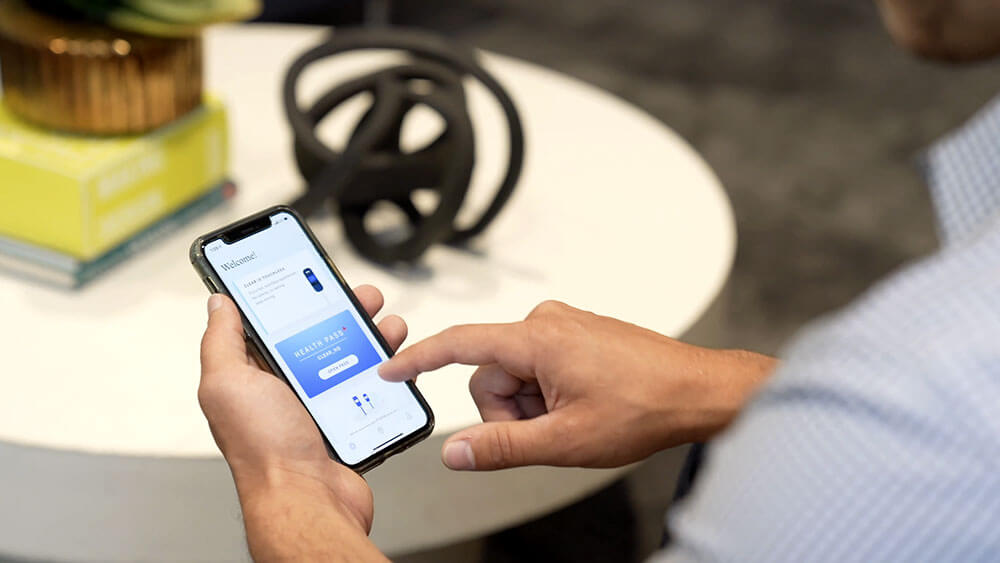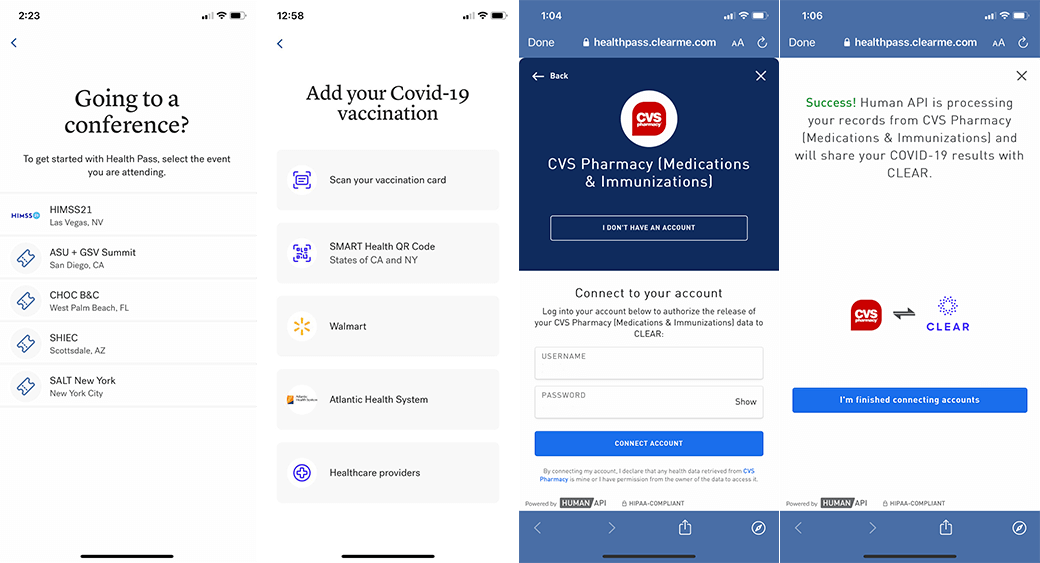
In-person participants at HIMSS’ Global Health Conference & Exhibition in August will be able to use the Clear Health Pass on their phones as one of the options to show proof they are vaccinated against COVID-19. (Courtesy Clear)
On August 9, HIMSS — the Healthcare Information and Management Systems Society — kicked off its Global Health Conference & Exhibition in Las Vegas. The organization is one of the first in the industry to employ a vaccine mandate in which every on-site staff member and attendee must provide proof of vaccination prior to entry.
To oversee and run that verification process, HIMSS has employed two third-party partners — SafeExpo and CLEAR Health Pass. Legal and privacy reasons aside, outsourcing the process to a digital service like CLEAR Health Pass has another upside — independent verification of vaccination records. As reports of fake vaccination cards have increased, that kind of factchecking can help to ease concerns of organizers, venue staff, and attendees alike.
As one reader wrote to Convene, “My state has provided a document that can be reproduced on an index card if one was so inclined. I don’t see any way to get around this so I am concerned about the ‘honor system,’ especially when it comes to group travel.”
An “honor system” is exactly what the U.S. has in terms of proving vaccine records. As The Atlantic points out in a May 2021 article, there is no federal database — states keep their own digital vaccination records. Handwritten on CDC-issued white cardstock, physical vaccination cards also are fairly easy to replicate.
“Unfortunately, it’s hard for us to tell if something is fake,” Matt Laws, CEO of Safe Expo, told Convene, adding that the company does include a disclaimer stating that it is illegal to provide a fake vaccination card. Last week, two airline passengers learned that the hard way when they presented forged vaccination cards and test results to enter Canada and were fined nearly $16,000 each.
A number of venues and events are opting to use CLEAR Health Pass for vaccination verification for right to entry, which independently confirms vaccine records — if the user has the option and chooses that option.
I tested it out for myself. I can choose to either scan and upload my vaccination card or I have the option of connecting with my health-care provider to digitally pull my vaccine record. In my case, that’s CVS. After signing a HIPAA authorization form allowing CVS to disclose my records to CLEAR, the app directed me to my CVS account. After successfully logging in, I received a message that my request is being processed — no further action needed.

The CLEAR app makes it easy to add your COVID-19 vaccination records.
CLEAR has partnered with hundreds of vaccine providers and pharmacies, as well as the states of California or New York, for users to directly link their vaccination records from a provider’s database. Currently, however, that network is limited to the U.S. If a user’s provider isn’t a partner, they can opt to upload their vaccination card and create a digital copy instead.
In that case, according to a representative from CLEAR, the app verifies the individual’s identity and confirms that that the verified individual has uploaded a physical card. “We use our secure identity platform to verify the individual’s identity and utilize image capture technology, OCR, and machine learning to identify the physical traits of the card,” said Ken Lisaius, a spokesperson for CLEAR. “The individual then manually confirms the vaccination information from the card. Linking the uploaded CDC card to an individual’s verified identity provides greater trust and fidelity than a physical card alone.”
CLEAR Health Pass isn’t the only option in the vaccine passport game. VaxYes offers another independent, app-based option for events, which uses AI and trained medical professionals along with contacting states directly in its multilevel verification approach. That process, however, can be flexible. “The organizer is free to define what certification level works for them, and VaxYes works to help organizers understand the details behind each level,” said Kevin Loughery, a spokesperson for VaxYes.
Jennifer N. Dienst is managing editor at Convene.
